All Categories
Featured
Table of Contents

[/image][=video]
[/video]
However, prior to you rush to call a plumbing or make some bad DIY choice, you might want to have a look at these pipes secrets that can save you time and cash. It is essential to recognize where you water shut off valve is in your home, as this can save you from even more major damage when pipes concerns take place.
When everything is transformed off, have a look at your water meter. If the meter remains to move, it's likely that you have a leakage somewhere in your system. This technique won't inform you where the leak stems, but it's a great initial step toward identifying a trouble. An ongoing movement on your water meter when all water sources are shut off is a clear warning that requires immediate interest.
Slow-moving drains are often a very early warning indicator of a larger problem. It might indicate an obstruction in the production, an issue with your sewage system line, and even tree roots penetrating your pipelines. As opposed to waiting on the drain to end up being entirely blocked, do something about it as quickly as you discover a stagnation.

If these don't work, it might be time to hire an expert. Overlooking the problem can result in more major and pricey troubles down the line. Knowing where your major water shutoff valve is can conserve you from possible water damages in instance of a major leakage or plumbing catastrophe.
Should I Do My Own Plumbing?
Make sure every family grown-up understands where the shutoff valve is and just how to use it. In case of a serious leak, rapidly turning off your home's water supply can decrease damages and give you tranquility of mind while you await a plumber to arrive. It's a preferred idea that chemical drainpipe cleaners are the best service for clogged up drains a notion that could not be even more from the fact.
The chemicals can wear away the inner lining of the pipes, leading to damaged structures, leaks, and even pipeline bursts. They can permeate right into groundwater and pollute it, presenting risks to local ecosystems.
These tools can properly clear obstructions without triggering any type of damages to your pipelines. If these approaches do not function, do not think twice to call an expert. Additionally, bear in mind that avoidance is constantly much better than remedy. Stay clear of putting grease, oil, or any strong waste down your drains pipes, as they can solidify and cause obstructions.

Over-tightening can lead to lots of problems, consisting of removed screws and busted screws, resulting in leakages or also water damages. This typical mistake in Do it yourself plumbing tasks can turn a small repair into a costly undertaking.
Should I Do My Own Plumbing?
Plumbing's tape, or Teflon or thread seal tape, is an essential device for every house owner. It creates watertight seals at pipeline threads, avoiding leakages at joints and links.

Before connecting any type of installations, take a minute to cover a couple of layers of plumbing technician's tape around the threads in a clockwise instructions. See to it the tape covers all the threads and is covered securely. This simple yet critical step can save you from managing annoying leaks down the line.
Keep in mind that for larger issues, expert help is always suggested. To stop this from occurring, think about setting up pipeline insulation.
And also, during colder months, pipeline insulation can aid avoid your pipelines from freezing and rupturing a scenario that can lead to expensive fixings. When it comes to sealing fixtures like faucets, numerous DIY lovers naturally reach for a plumber's putty. Yet there's an option that may serve you better silicone caulk.
Is Diy Plumbing Safe?
This adaptability allows it to fit slight shifts or activities without breaking the seal, supplying an extra durable and long-lasting solution. Just remember to allow the caulk treatment totally according to the manufacturer's directions before revealing it to water to guarantee the very best results. "Doping" in pipes refers to applying pipeline dope, or pipeline joint substance, to the strings of pipes links before they're screwed together.
Latest Posts
The Definitive Guide to Identity Protection Tools
Not known Facts About Identity Protection Tools
24/7 Plumber